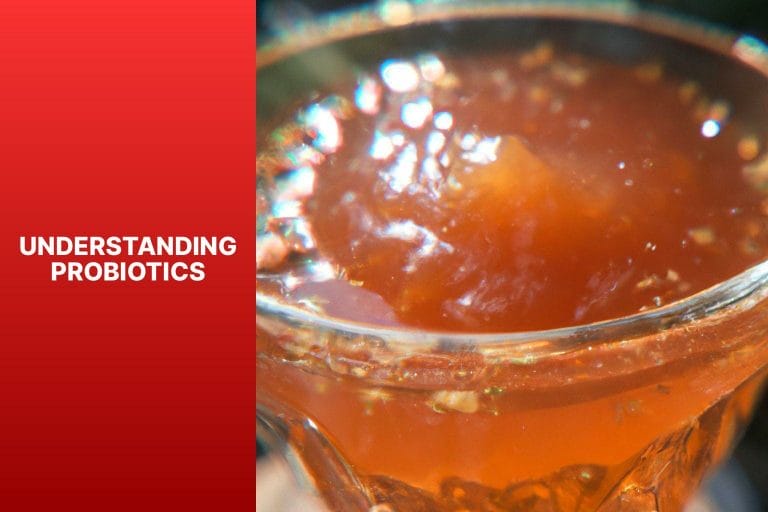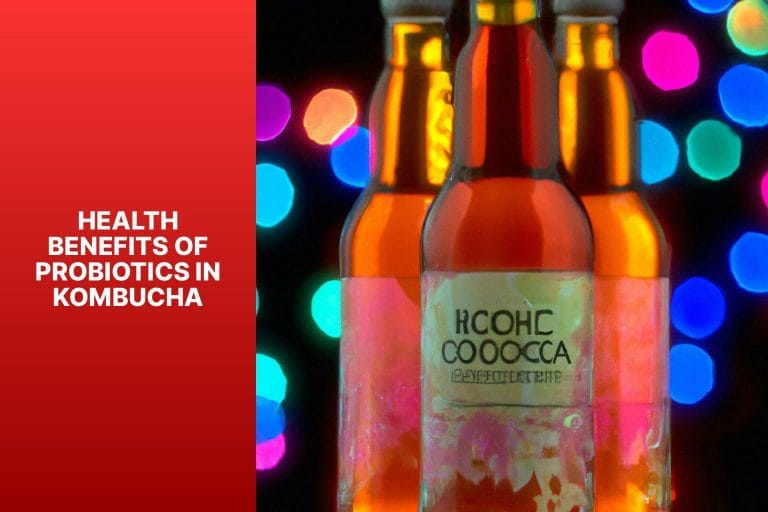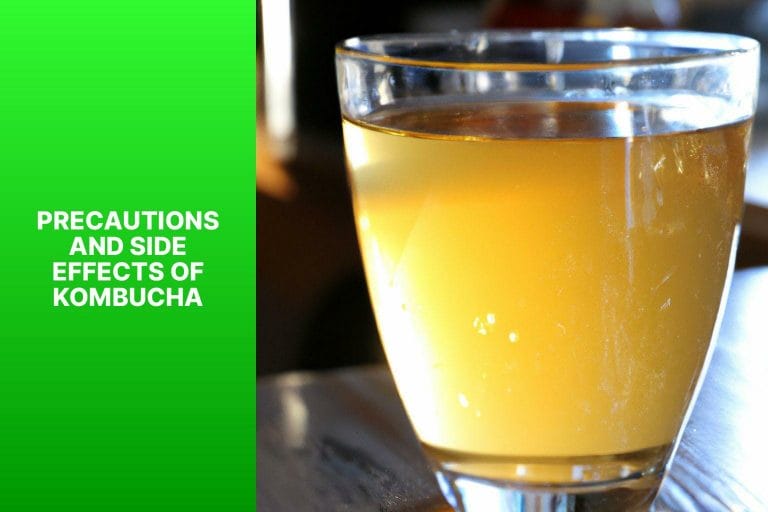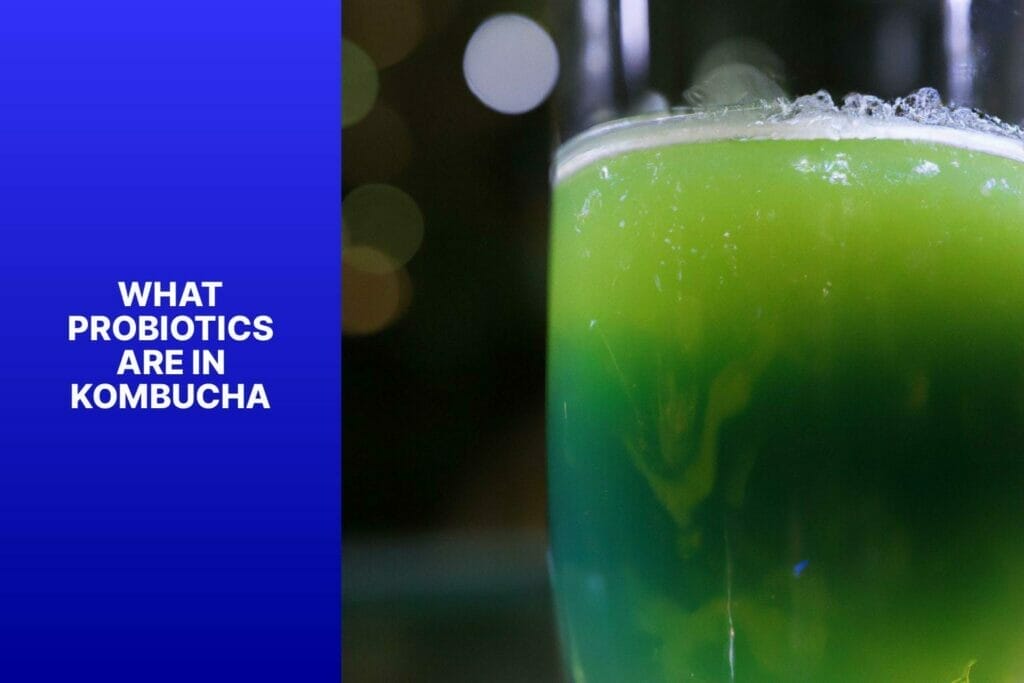Probiotics have gained significant attention for their role in promoting gut health and overall well-being. Kombucha, a popular fermented tea beverage, is often celebrated for its probiotic content.
Understanding the probiotics in Kombucha and their potential health benefits can help you make informed choices for your digestive health.
It’s important to understand what probiotics are. Probiotics are live bacteria and yeasts that offer various health benefits, particularly when consumed in adequate amounts.
They are commonly found in fermented foods and beverages and help maintain a healthy balance of microorganisms in the gut.
Kombucha is a fermented tea made by adding a culture of bacteria and yeast to a sugar-sweetened tea mixture. The bacteria and yeast consume the sugar during fermentation, producing a bubbly and tangy beverage.
This fermentation process gives Kombucha its probiotic properties.
Kombucha contains several strains of probiotics, including Lactobacillus, Bifidobacterium, Saccharomyces boulardii, Streptococcus thermophilus, and others. Each strain offers unique health benefits.
The health benefits of probiotics in Kombucha are numerous. They support improved digestive health by maintaining the balance of beneficial bacteria in the gut, promoting regularity, and aiding in nutrient absorption.
Probiotics in Kombucha may enhance immune function, helping to fight off infections and boost overall immunity.
Some studies suggest that probiotics may have potential mental health benefits, as they play a role in the gut-brain axis and may help alleviate symptoms of anxiety and depression.
Probiotics in Kombucha may support weight management by influencing metabolism and reducing inflammation.
When choosing Kombucha for its probiotic content, opting for raw and unpasteurized varieties is essential, as pasteurization can kill the beneficial bacteria.
Look for kombucha brands that specifically mention live cultures and the strains of probiotics present in their product.
While Kombucha can offer numerous health benefits, it’s important to be aware of precautions and potential side effects.
Some individuals may experience digestive discomfort or allergic reactions. It’s recommended to start with small amounts and monitor your body’s response.
Key takeaway:
- Probiotics in kombucha support digestive health: Kombucha contains probiotics like Lactobacillus and Bifidobacterium, promoting a healthy gut and improved digestion.
- Kombucha boosts the immune system: The probiotics found in Kombucha, such as Saccharomyces boulardii and Streptococcus thermophilus, help enhance immune function and reduce the risk of infections.
- Potential mental health and weight management benefits: Studies suggest that the probiotics in Kombucha may positively affect mental health and weight management. However, further research is needed to confirm these benefits.
Understanding Probiotics

Photo Credits: Standardkombucha.Com by Logan Harris
Understanding probiotics is crucial for making informed decisions about incorporating them into our diet.
Probiotics are beneficial live bacteria and yeasts that, when consumed in adequate amounts, can help maintain a healthy balance of gut bacteria, improve digestion, boost the immune system, and enhance overall well-being.
Probiotics are commonly found in fermented foods like yogurt, kefir, sauerkraut, and kimchi. They can also be obtained from certain supplements.
When selecting probiotic foods or supplements, it is important to look for specific strains of bacteria that have been scientifically studied for their health benefits.
Lactobacillus and Bifidobacterium are two well-known probiotic strains.
To ensure the effectiveness of probiotics, it is crucial to consume them regularly and in sufficient amounts.
The recommended daily intake of probiotics varies depending on the strain and product, but a general guideline is to aim for at least 1 billion colony-forming units (CFUs) per serving.
Pro-Tip: When choosing probiotic supplements, it is advisable to opt for ones that are stored in a cool, dry place and have an expiration date to ensure the viability of the bacteria.
Incorporating various probiotic-rich foods into our diet and including prebiotic fibers can help nurture a diverse and healthy gut bacteria population.
Understanding probiotics is key to making informed decisions about including them in our diet.
We can improve our digestive health and overall well-being by consciously selecting probiotic-rich foods or supplements with specific strains and consuming them regularly.
What Is Kombucha?
Kombucha is a fermented beverage known as “What Is Kombucha?” and is made from sweetened black or green tea.
During fermentation, bacteria, and yeast culture is added to transform sugars into organic acids and carbon dioxide, resulting in a slightly fizzy drink with a tangy flavor.
Kombucha has been consumed for centuries and is believed to have originated in China. It has gained popularity due to its potential health benefits.
The fermentation process produces probiotics, beneficial bacteria supporting gut health and digestion.
In addition to probiotics, Kombucha contains antioxidants that protect the body against free radicals and oxidative stress. It has fewer calories and less sugar than soda or other sugary drinks, making it a healthier alternative.
One interesting fact is that Kombucha can be brewed at home using a starter culture called a SCOBY. This allows for the customization of flavors and experimentation with different teas and ingredients.
Next time you want a refreshing and potentially beneficial drink, try Kombucha to enhance your well-being.
Probiotics in Kombucha
Discover the powerhouse of probiotics found in Kombucha! Get ready to dive into the world of beneficial bacteria that can boost your gut health and overall well-being.
From Lactobacillus to Bifidobacterium, Saccharomyces boulardii to Streptococcus thermophilus, and many others, each sub-section will unveil these probiotics offer unique benefits and contributions.
Let’s learn how these live cultures can revolutionize your digestive system and enhance your immune system. Prepare for a delightful journey through the probiotics in Kombucha!
Lactobacillus
Lactobacillus is a probiotic found in kombucha. It offers health benefits and belongs to the lactic acid bacteria family. Below is a table with key information about Lactobacillus in Kombucha.
| Type of Probiotic | Lactobacillus |
|---|---|
| Classification | Lactic acid bacteria |
| Health Benefits | – Supports digestive health |
| – Enhances immune function | |
| – May have potential mental health benefits | |
| – Could support weight management | |
| Other Information | – Lactobacillus ferment and produce lactic acid, creating the tangy flavor of Kombucha. |
| – Different strains of Lactobacillus may be present in different kombucha brands. |
When choosing a kombucha for the probiotic benefits of Lactobacillus, it is important to consider the specific strains present. Some strains may have stronger effects on digestive health, immune function, mental health, or weight management.
It is also important to check the quality and safety of the brand, ensuring proper fermentation methods are used to maintain the probiotics’ viability.
Including Kombucha with Lactobacillus in your diet can promote overall wellness. It is recommended to consult with a healthcare professional before making significant changes to your diet or health routine.
Note: The table information is based on general knowledge about Lactobacillus in Kombucha and may vary depending on the brand and fermentation process.
Bifidobacterium
Bifidobacterium strains in Kombucha enhance digestive health by promoting beneficial gut bacteria growth. They also improve immune function by supporting the body’s defense against harmful pathogens.
Research suggests that Bifidobacterium may positively influence mood and reduce symptoms of anxiety and depression. These probiotics may aid in weight management by helping with nutrient breakdown and absorption in the digestive system.
To ensure the benefits of Bifidobacterium in Kombucha, choose brands that specifically mention the presence of Bifidobacterium strains.
Check the label or website for detailed probiotic information. Consider the brand’s quality, reputation, and personal taste preferences.
If you have underlying health conditions or take medications, consult a healthcare provider before adding Kombucha or any new supplements to your routine.
By making an informed decision, you can enjoy the potential positive effects of Bifidobacterium in Kombucha.
Saccharomyces boulardii
Saccharomyces boulardii is a probiotic found in Kombucha. It improves digestive health by balancing gut microflora, alleviating symptoms of digestive disorders. It boosts immune function by stimulating antibody production and increasing immune cell activity.
Research suggests it may have mental health benefits, reducing anxiety and depression by improving gut-brain communication. Some studies indicate it may contribute to weight management by regulating appetite and promoting beneficial bacteria growth in the gut.
When choosing probiotic Kombucha, look for brands that mention Saccharomyces boulardii. Check the label for quality ingredients and live cultures.
Consult a healthcare professional before taking Saccharomyces boulardii, especially with underlying health conditions or medications.
Streptococcus thermophilus
Streptococcus thermophilus is a beneficial bacteria found in probiotics like Kombucha. It is also commonly used in yogurt and other dairy products.
| Probiotic Strain | Streptococcus thermophilus |
| Characteristics | Thrives in high-temperature environments |
| Health Benefits | Enhances lactose digestion and helps maintain a healthy gut flora |
| Functions | Produces lactic acid, creating an acidic environment that inhibits harmful bacteria growth |
| Complementary Strains | Lactobacillus, Bifidobacterium, Saccharomyces boulardii |
| Precautions | People with lactose intolerance or dairy allergies should avoid consuming products containing Streptococcus thermophilus |
Streptococcus thermophilus helps with lactose breakdown, which benefits lactose-intolerant individuals. It also promotes a healthy gut flora by producing lactic acid, creating an unfavorable environment for harmful bacteria.
Individuals with lactose intolerance or dairy allergies should be cautious when consuming Streptococcus thermophilus products. If you have any concerns or underlying health conditions, it is advisable to consult a healthcare professional.
Others
The “Others” category of probiotics in Kombucha includes strains that contribute to the health benefits of this fermented beverage. Here are some of the probiotics found in Kombucha:
– Lactococcus lactis: Supports digestive health.
– Leuconostoc mesenteroides: Enhances the immune system.
– Lactobacillus brevis: Helps maintain a healthy gut.
– Pediococcus acidilactici: Improves digestion and nutrient absorption.
– Acetobacter sp.: Contributes to the fermentation process.
These probiotic strains promote overall well-being and support specific health functions. The amounts of these probiotics in Kombucha can vary, depending on the brewing process and brand.
They contribute to the diverse range of beneficial bacteria found in this beverage.
Fact: Kombucha is a natural source of probiotics and also provides a refreshing taste.
Health Benefits of Probiotics in Kombucha

Photo Credits: Standardkombucha.Com by Elijah Lewis
Discover the remarkable health benefits that probiotics in Kombucha can offer. The power of probiotics is truly transformative, from improved digestive health to enhanced immune function and potential mental health benefits.
Kombucha might also provide support for weight management. So, let’s dive into these sub-sections and explore how probiotics in Kombucha can improve our overall well-being.
Get ready to unlock the secrets of this fizzy, fermented beverage and its probiotic wonders!
Improved Digestive Health
- Kombucha’s probiotics improve digestive health.
- The probiotic strains commonly found in Kombucha, including Lactobacillus, Bifidobacterium, Saccharomyces boulardii, and Streptococcus thermophilus, restore and maintain a healthy balance of gut bacteria.
- These probiotics break down food efficiently, aid nutrient absorption, and promote regular bowel movements.
- Probiotics also alleviate symptoms of digestive disorders such as bloating, gas, and diarrhea.
- Regular consumption of Kombucha supports a healthy digestive system and may even relieve irritable bowel syndrome (IBS) symptoms or inflammatory bowel disease (IBD).
- It is important to note that the effectiveness of probiotics may vary, and results may not be immediate.
To improve your digestive health, consider adding Kombucha to your diet. Consult a healthcare professional, especially if you have pre-existing health conditions or concerns.
Enhanced Immune Function
Enhanced immune function is one of the health benefits of consuming probiotics found in Kombucha. These probiotics can increase antibody production, regulate the immune response, reduce the risk of infections, and decrease inflammation.
By incorporating probiotics into your diet through Kombucha, you support your body’s natural defense mechanisms and promote a balanced immune system.
The use of probiotics for immune health has a rich history, as fermented foods and beverages have been consumed for centuries due to their potential health benefits.
Kombucha, a fermented tea, has been enjoyed for its digestive and immune-supporting properties.
As Kombucha gains popularity as a delicious beverage, it is also recognized for its potential to enhance immune function.
Potential Mental Health Benefits
Kombucha contains probiotics that have the potential to positively impact mental health by regulating the gut-brain axis.
The probiotics Lactobacillus and Bifidobacterium found in Kombucha can influence this communication pathway between the gut and the brain.
Scientific studies suggest that these probiotics may effectively reduce symptoms of anxiety and depression. Another probiotic strain, Saccharomyces boulardii, present in Kombucha, shows promising anti-anxiety effects.
For individuals interested in exploring Kombucha’s potential mental health benefits, it is recommended to opt for brands that specifically mention these probiotic strains.
It is essential to consult a healthcare professional before making significant changes to your diet or health routine.
Incorporating Kombucha into a balanced lifestyle that includes proper nutrition, regular exercise, and stress management can contribute to overall well-being.
Possible Weight Management Support
Kombucha is a fermented beverage that provides possible weight management support. Probiotics, such as Lactobacillus and Bifidobacterium, found in Kombucha, can naturally enhance digestive health, improving weight management.
Various studies have indicated that the probiotics in Kombucha may aid in reducing body weight and body fat percentage; however, individual results may vary.
Kombucha is a low-calorie beverage that offers a healthier alternative to sugary drinks for individuals managing their weight.
It’s important to note that Kombucha should be consumed as part of a balanced diet and a healthy lifestyle for effective weight management.
To support weight management, consider incorporating Kombucha into your daily routine alongside a nutritious diet and regular physical activity.
Before making significant changes to your diet or exercise regimen, it is advised to consult with a healthcare professional.
Choosing the Right Kombucha for Probiotics
When selecting Kombucha for probiotics, it is important to consider the brand, fermentation process, and live cultures.
Opt for brands that undergo traditional fermentation with a SCOBY as they usually contain multiple strains of live cultures, including beneficial bacteria such as Lactobacillus and yeasts like Saccharomyces.
Consider brands that utilize an extended fermentation process with added probiotic cultures for higher probiotic content.
These may include specific strains like Bifidobacterium and Lactobacillus acidophilus. It is advisable to be cautious of brands prioritizing carbonation over probiotics, as they may have minimal live cultures.
Hence, choose a kombucha brand that suits your probiotic needs to reap the potential health benefits.
Precautions and Side Effects of Kombucha

Photo Credits: Standardkombucha.Com by Keith Baker
When consuming Kombucha, knowing the precautions and potential side effects is crucial. Here are some important points to consider:
– Allergic reactions: In rare cases, the fermentation process can cause allergic reactions such as hives, swelling, or difficulty breathing. If any allergic reactions occur, it is essential to seek immediate medical attention.
– Interaction with medications: Kombucha contains organic acids and compounds that might interact with certain medications. It is advised to consult a healthcare professional if you are taking any medications to ensure no potential adverse effects.
– Digestive discomfort: Excessive consumption of Kombucha can lead to gas, bloating, or an upset stomach. To assess tolerance, starting with small amounts and gradually increasing intake is recommended.
– Alcohol content: The fermentation process naturally produces a trace amount of alcohol in Kombucha. Certain brands or homemade variations might have higher levels. Individuals who are sensitive to alcohol or avoiding it should exercise caution.
– Pregnancy and breast-feeding: Limited research is available on the consumption of Kombucha during pregnancy or while breastfeeding. It is generally advised to consult a healthcare professional before including Kombucha in your diet.
By understanding these precautions and potential side effects, individuals can make informed decisions about consuming Kombucha and ensure a safe experience.
Some Facts About What Probiotics Are in Kombucha:
- ✅ Kombucha contains over 50 varieties of probiotics, such as Bifidobacteria, Lactobacillus, and Acetobacter. (Source: Cultures for Health)
- ✅ Kombucha offers diverse probiotics that can support gut health and overall wellness. (Source: Cultures for Health)
- ✅ The probiotic content in Kombucha can vary depending on the formulation and fermentation conditions used. (Source: Cultures for Health)
- ✅ Kombucha can improve gut health by populating the gut with beneficial microorganisms, maintaining acidity, and reducing inflammation. (Source: Cultures for Health)
- ✅ Some bacterial strains found in Kombucha, such as Lactobacillus and Bifidobacterium, can reduce inflammation and improve mental health. (Source: Cultures for Health)
